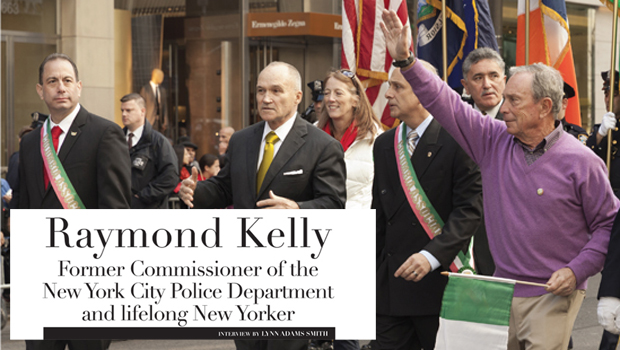Raymond Kelly: Former Commissioner of the New York City Police Department and Lifelong New Yorker

Interview by Lynn Adams Smith
As Police Commissioner, you spearheaded the modernization of the New York City Police Department and created a counter-terrorism operation. How many planned terrorist attacks did your team avert, and are other urban cities adopting your model for a counter-terrorism operation?
In 2002, we created a counter terrorism bureau, the first and only one of its kind at the municipal level. To better assess threats coming from overseas, we established an overseas intelligence liaison program, in which we stationed NYPD detectives in eleven foreign cities, such as London, Tel Aviv, Toronto, and Amman. But unlike federal intelligence offices overseas, the NYPD’s detectives are embedded with each country’s police forces, which affords them access and ability to respond quickly. For instance, with the Mumbai attacks in 2008, this program allowed us to have officers on the ground in Mumbai within one day of the attacks ending. And three days after that, we had a full report that we shared with the FBI and our constituents. We also learned that in Mumbai, the terrorists seemed to have a better idea of the topography than the Indian police forces. As a result, we recorded and photographed the insides of all major hotels in New York as a precautionary measure. We built a real-time crime center, a state-of-theart facility that searches computer records, to give investigators early information on past crimes. In all of this, we used technology to create smarter policing methods. Through this active policing, the NYPD and its formal partners have foiled 16 attacks that we know of. We are sharing information, tools, and other best practices with agencies, both domestic and international, as well as with other cities. That said, each city is unique and has a different set of challenges. What works here may not work in another city and what works there may not work here.
Why did the murder rate in New York City drop so dramatically low while you were Police Commissioner?
By all accounts, New York City, is the safest it has ever been. The murder rate, in addition to all major crime rates, fell dramatically because of more active and smarter policing. In 2013, New York saw 333 murders on a population of 8.3 million, which is far lower than most other major American cities. We saw a 40 percent decrease in violent crime over the last 12 years. The use of technology has been vital in dropping crime to historic lows. As I mentioned, the real-time crime center is central to the rise of technology within the NYPD. The Domain Awareness System, designed by the NYPD and Microsoft, uses data from a network of cameras—the city has over 7,000 and also draws upon the security cameras of companies. Radiation detectors, license plate readers, and crime reports track suspicious people and activities. This program allows us to query camera footage from all over New York and then get that information quickly to officers. We worked on having a more public police presence, putting officers near popular tourist landmarks and shopping areas. We also put the officers in more at-risk areas. We encouraged the officers to engage with the communities in which they serve, and the NYPD increased diversity, now having officers born in 106 countries who speak 80 languages. The stop, question, and sometimes frisk tool that we use, and which is used by police departments all over the United States, is validated by the Supreme Court case, Terry vs. Ohio. It has been proven, in conjunction with the other steps we’re taking, to reduce crime. And perhaps the most notable thing is that we did all this at a time when we lost 6,000 officers due to budget cuts.
Do you think marijuana should be legalized?
I was a supporter of Governor Cuomo’s effort to change the designation of minor marijuana possession to a violation statewide. That said, I don’t think marijuana should be legalized yet, until we know more. Literature in this area has indicated a strong and positive relationship between marijuana and other drug use as well as crime. Colorado and Washington (once they start selling in June) will provide interesting laboratories. While it is still a bit early, we can use what we learn on the actual rather than perceived effects of legalization in both states. We can determine how legalization affects rates of marijuana usage, and its role, if any, as a gateway drug (that is, leading to other drug use). Additionally, we can see if crimes, violent and non-violent, increase as a result of legalization. We mustn’t be naïve to the realities of the economic gains, but we also must ask whether these benefits outweigh a society that is potentially less safe and secure.
What is your personal workout routine and how else do you spend your free time when you need to relax or have some fun?
I work out regularly. Since I was college student, I have enjoyed working out. It’s a great way to relieve stress, but I also use it as a time to reflect on things I did that day and also what I have to do tomorrow. I like watching television shows, particularly The Daily Show and The Colbert Report, both of which I find not only funny, but informative. Both Jon Stewart and Stephen Colbert are smart. I enjoy watching sports, especially football and baseball. I like traveling and recently went to Europe on vacation and got to spend time in Paris, Vienna, and Berlin. But for me, the best way to relax is to spend time with my family.
What can ordinary citizens do to help make New York City a safer place?
New York has, in part, become safer because New Yorkers have been more vigilant. The “See Something, Say Something” campaign has been a success. We have had citizens report crimes and suspicious activities. Faisal Shahzad, the Times Square bomber, was foiled because two street vendors noticed his car was smoking and alerted authorities. Further, 311, New York’s information number, can be used to report a variety of issues, like excessive noise, graffiti, or damaged trees. By taking care of these issues, they don’t turn into something larger. By taking care of neighborhood concerns, we can preemptively prevent crime. We have not had a successful terrorist attack since 9/11. We mustn’t get lulled into a false sense of security; the key to staying safe is that New Yorkers must continue to be vigilant.
Since leaving your post as Police Commissioner, you have joined the Council on Foreign Relations (CFR). What is the function of the CFR what will be the focus of your work as a Distinguished Visiting Fellow?
The Council on Foreign Relations is one of the premier foreign affairs think tanks in the world. It is also a membership organization and the publisher of Foreign Affairs magazine. The staff here is top notch and is regularly consulted by governments, media, and businesses. I must say it’s truly been a pleasure to work at CFR. And seeing all the smart, thoughtful, and hardworking people here is invigorating. It puts my mind at ease, because I know that these people will be in high-level positions, leading governments, companies, and in academia, for years to come. Having been here since January, my work has focused on national security issues, including counterterrorism, policing, and cybersecurity. I’ve also discussed the role of security at public events, like the Super Bowl and the Sochi Olympics. A number of impressive individuals have previously held my position, Distinguished Visiting Fellow, including Stanley Fischer, who was just nominated to be the next Fed vice chair, former Treasury Secretary Tim Geithner, Peter Orszag, who was the director of the Office of Management and Budget in the Obama administration, and Mervyn King, who served as governor of the Bank of England.
You recently accepted Governor Cuomo’s invitation to be a special adviser to the state in setting up the nation’s first college on emergency preparedness and homeland security. What is the timeframe for establishing the school and what type of faculty and student body are you hoping to attract?
I am honored by Governor Cuomo’s invitation. This will be a four-year college that will prepare young men and women in various aspects of homeland security, including law enforcement and intelligence gathering. Aimed at pushing for more emergency preparedness in the face of new and not-yet-existing challenges, the school will have courses in a number of areas, including how to respond to major emergencies, coordinate large events, and liaise with other agencies. The timeframe is not clear as of yet, but what is clear is that this is truly a great idea from Governor Cuomo. This is something that is highly needed, and it is here to stay. It’s my hope that this school will attract students and faculty from around the world. New York and more broadly, the United States, have been threatened in a variety of ways, but disaster response needs a core group of people able to answer the charge. It is one thing to create plans devoted to prevention. But what happens if something does happen? You need a plan, and this school will engender such action. This is a field that is, unfortunately, going to grow and get worse. We have to be prepared to respond to these challenges.

